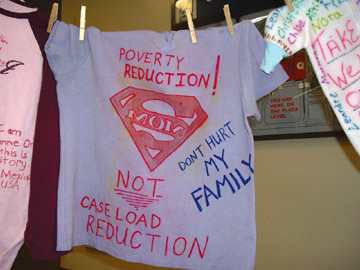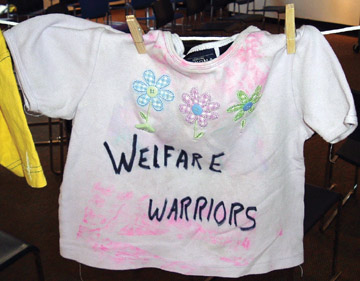Of the people, by the people and for the people was the refreshing message of hope in “The Shirts Off Our Backs” art exhibit put on by UMB’s A.R.M.S. Center (Advocacy for Resources for Modern Survival), Alcohol Addiction Resource Center and Women’s Center last Wednesday, March 24 in the Harbor Art Gallery. The exhibit, accompanied with a poignant presentation concerning the urgent issue of low-income and welfare recipient mothers struggling in the world of higher education was an afternoon of exposure for many students who were not aware of this valuable component of the UMB community.
“The Shirts Off Our Backs” is a traveling exhibit of the Welfare Made a Difference Campaign, which first landed in the White House in 2003 as a message for the executive office, house and senate to not take the shirts off the backs of poor people through legislation. The exhibit consisted of clotheslines strung diagonally around the gallery, similar to what one might see in that familiar domestic setting of an urban apartment terrace, or the backyard of a country home. But there were no socks, pants, sheets, towels or undergarments draped on these clotheslines. Instead, colorful t-shirts, long underwear, blouses and fuzzy baby suits were adorned with words and statements of welfare recipients, mainly mothers and their children.
The shirts held powerful messages such as, “When I was 16, a case worker told my parents that they could not receive welfare. My parents believed her and we did not argue. So we were homeless for four months, and I had my 17th birthday on the streets because the politicians wanted to keep the welfare roles down.” Another distressing message read, “When will I be a kid? I have to watch my brother and sister. I can’t be a kid. It’s not fair. I have no life. I’m a kid. I need to be a kid.” Students were silent and in awe as they read the messages carefully, walking slowly, eyes moving over the prose as they inhaled the stories of women and children from around the country.
The A.R.M.S. center is a key actor in making it possible for the underprivileged to study here at UMB. They do this by training students with survival strategies, providing a support network, disseminating resources on welfare and working closely with allied members and organizations. A.R.M.S. outreach extends beyond UMB borders into the streets in shelters, welfare offices and clinics-informing individuals about their rights and keeping them up to date on new legislation and how to actively join the fight against poverty.
Dottie Stevens is not the first to acknowledge that it is not easy to get a university education combating a hostile system set up to cause academic failure. Stevens was the keynote speaker of the exhibit/presentation and proudly introduced herself as “that hardcore parasitic welfare recipient you hear about.” Her story was one of making it through UMB, receiving her B.A. and M.A. from CPCS, while on welfare as a single mother. Stevens became a leader in the fight against poverty here after taking a class in CPCS in the mid-1980s titled “Basic Organizing.” Going into the class, she thought she was going to learn how to organize an office. The class consisted of 13 women, all welfare mothers who learned about the history of welfare in this country and became true advocates, forming a group called “Survivors, Inc.”
The group is now a non-profit organization that offers support, education and action for welfare mothers and their allies. The founders were all UMB welfare mothers who bonded in the classroom while studying welfare legislation and sharing their stories. They discussed the humiliating transactions and encounters of daily life on welfare, here on campus and in the outside world.
The organization has published a successful bi-annual periodical, met with federal officials, published video documentaries and continues working in the community towards making education and careers possible for low income women. They have worked together and networked with the A.R.M.S. Center to create a safe place here on campus. “The Shirts Off Our Backs,” along with this uplifting presentation, successfully brought the struggle of low-income women into the lives of spectator students here at UMB. The traveling exhibit and presentation created a powerful, multi-layered experience.






















































